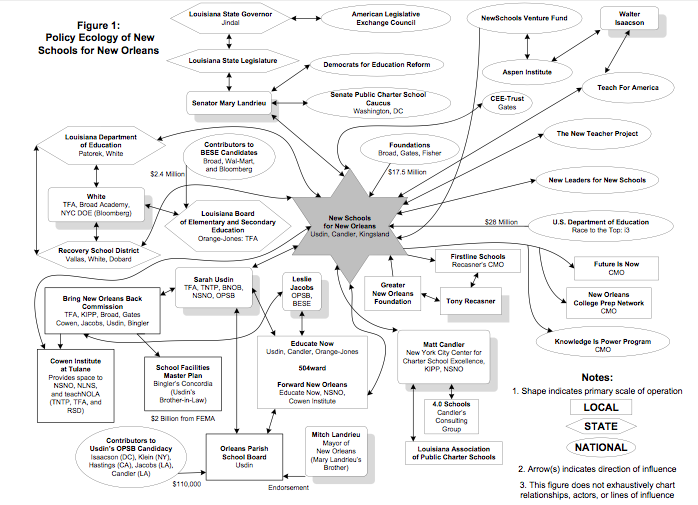Cloaking Inequity: Who Dat Say?: New Orleans Ed Reform Unmasked

Who is really behind NOLA education reform? Let’s unmask them. Last year, the charter school incubator New Schools for New Orleans published a Guide for Cities that touted New Orleans school reform as a national model. In fact, a barrage of reports has been issued since 2005 that make the same claim. The Guide for Cities was delivered by Louisiana Senator Mary Landrieu to policymakers in Washington, DC. She proclaimed,
Through relentless focus on accountability, human capital, and charter school development, New Orleans has become a national leader in education reform.
An important question to ask is: Who says so? Who is really behind the reform?
This question was posed in my new peer-reviewed article published in the Berkeley Review of Education, which critiques the Guide for Cities and presents the testimony and experiences of those left out of mainstream discussions on New Orleans school reform—namely, black teachers, students, and community members. Writing various longstanding education groups, we declared the following about school reform in NOLA in our Warning to Communities:
Based on our experiential knowledge and qualitative research over nearly a decade, we do not believe that New Orleans school reform represents a guide for cities. Instead we assert that current reforms, including human capital and charter school development, have been immensely destructive to African American students, veteran teachers, and historically black neighborhoods in New Orleans. Ours is a warning for communities nationally. These “reforms” are not a guide for cities; they are a stark threat to the education, cultural integrity, and political-economic power of communities struggling for a semblance of justice.
The Guide for Cities, we protest, did not incorporate the views of those targeted and most intimately affected by the charter school takeover and mass recruitment of inexperienced Teach for America teachers. “We have grave concerns that the stakeholders who were consulted for the Guide included only advocates of current reforms, such as state and district officials, charter school leaders . . . and philanthropists.” To be sure, the views of the Broad, Fisher, and Gates Foundations, NewSchools Venture Fund, Teach for America, and KIPP—all sectors of the entrepreneurial community that have capitalized on black children and urban public schools—were considered thoroughly.
Through striking firsthand testimony and review of research evidence, grassroots education groups share the following insights from New Orleans:
- First Lesson: Marginalization of indigenous veteran teachers and leaders is viewed as innovative by education entrepreneurs, who recruit inexperienced staff to teach in charter schools at the expense of our children.
- Second Lesson: The development and expansion of privately managed charter schools threaten to restructure public education as a business, with indigenous traditions and place-based curricula giving way to management practices that have little connection to students and what they need to achieve and thrive.
- Third Lesson: Rather than universally respecting students’ right to learn, charter schools focus on cost containment in special education and may exclude or fail to adequately serve students based on such concerns.
- Fourth Lesson: Human capital and charter school development are reforms imposed from above without genuine community engagement regarding how to improve local public schools.
Notably, there is no other city in the nation with a higher proportion of charter schools or a more aggressive campaign to recruit new teachers. Almost 80 percent of public school students in New Orleans attend charters now and most have been rated “D” or “F” by the State of Louisiana. A near-majority of the city’s teachers, recruited through Teach for America or The New Teacher Project, have been teaching for three years or less; black veteran teachers, who were unlawfully fired en masse in 2006, have been replaced by transient white recruits from outside the community (See also Forever Young). The collective bargaining agreement of United Teachers of New Orleans (AFT Local 527), a teacher union born from black teacher activism, was nullified when the state-run Recovery School District assumed control of the city’s schools. It’s hardly a model, unless one believes the strategic dispossession of black working-class communities by profit-hungry entrepreneurs is something to be replicated.
Education scholars, community-based education activists, and policymakers concerned about racial and economic justice should read and consider this Warning to Communities. Authors consciously chose a peer-reviewed, open-access publication venue to enable wide distribution, vouch for quality, and avoid bias. It is imperative that communities across the nation receive more than propaganda and media spin regarding how to improve local public schools.
Indeed, the Warning to Communities charts the elite policy network that surrounds school reform in New Orleans. It serves as a startling reminder that there is big money and powerful interests purposely manipulating human capital and charter school development at local, state, and national levels:
Who is really behind NOLA education reform? Let’s unmask them.
Grassroots education activists, however, have formed networks of their own to challenge the corporate assault. The Warning includes a short afterword by policy scholar Adrienne Dixson, parents, and students about a coalition of high school students organized to resist the “hostile takeover” of New Orleans public schools. “Students cannot be bought and sold,” declare the young activists. “[Our] opinions should have been considered, and [decisions] not done behind closed doors.”
Around the same time the Guide for Cities was released, I participated in a forum sponsored by Harvard University’s Graduate School of Education entitled “New Orleans Education Reform: Pass or Fail?” Sarah Usdin, founder of New Schools for New Orleans, which issued the Guide, was the other participant. Usdin cheered the “successes” of edu-business and ignored the voice from the community. Isn’t it about time for school reform to be shaped from the bottom-up rather than the top-down?
Next time New Orleans is proposed as an education model, it is probably best to ask, in the city’s well-known vernacular: Who dat say?
Kristen Buras is an Assistant Professor in the Department of Educational Policy Studies at Georgia State University. She is the coauthor of Pedagogy, Policy, and the Privatized City: Stories of Dispossession and Defiancefrom New Orleans. Her forthcoming book is entitled Charter Schools, Race, and Urban Space: Where the Market Meets Grassroots Resistance. She is the cofounder and director of Urban South Grassroots Research Collective and may be reached at kburas@gsu.edu.
See also: Louisiana Data=Berlin wall— What do they have to hide? and New Orleans’ Recovery School District: The Lie Unveiled and LA and the Recovery School District approach (SB1718): A P.T. Barnum Circus
Please Facebook Like, Tweet, etc below and/or reblog to share this discussion with others.
This blog post has been shared by permission from the author.
Readers wishing to comment on the content are encouraged to do so via the link to the original post.
Find the original post here:
The views expressed by the blogger are not necessarily those of NEPC.

